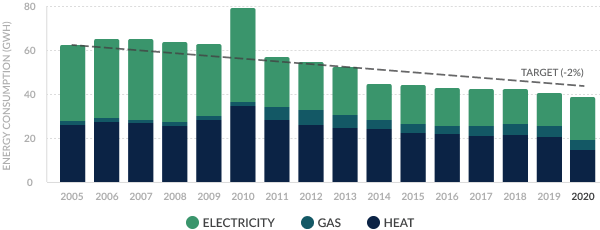The University of Twente commits to a binding, long-term agreement with the Dutch government to further reduce the energy consumption of its real estate. This takes the form of MJA-4 (MeerJarenAfspraken-4, or Multi-year Agreement 4). In practice, this means that the UT will work to reduce gas consumption on campus and improve the energy efficiency of its buildings. MJA-4 runs from 2023 to 2026 and is a continuation of MJA-3, which ran from 2005 to 2020.
Lower gas consumption, higher energy labels
MJA-4 is an umbrella agreement which all Dutch universities and universities of applied sciences can join. In concrete terms, the new agreements mean that the University of Twente promises to reduce gas consumption in its buildings by at least 4% per year and to ensure that, by 2030, all of its buildings will have energy label A on average. The agreements will be evaluated in 2025 and, if necessary, strenghtened further.
Vice-President Machteld Roos of the UT Executive Board is pleased with MJA-4. "It's clear that making our business operations more sustainable is a priority for the Executive Board. More importantly, many employees and students consider it to be very important. By making joint agreements with the government as higher education institutions, we join forces and can learn from each other. At the University of Twente, we have seen that previous multi-year agreements have borne fruit. We were keen to continue with them. I'm pleased that we have succeeded in doing so.”
Energy coordinator Henk Hobbelink: "It can be difficult to make joint agreements, because the Dutch universities are often in very different situations. For example, we heat our buildings via Twence's sustainable heat network, while other universities sometimes have monumental buildings that are still heated with gas." Despite these differences, universities can learn a lot from one another. "At the UT, we have put a lot of effort into measures to reduce energy consumption in recent years, such as installing better insulation, LED lighting and improving technical installations. Other universities have focused more on the generation of renewable energy, for example. Thanks to MJA-4, all participants have to report on progress in the same way. That makes it easier to compare our progress, share knowledge and inspire each other."

Energy consumption of UT buildings 2005-2020 (the duration of MJA-3). The objective was to reduce energy consumption by 2% each year, compared to 2005. The UT has more than achieved this goal.
30% lower energy consumption
Since 2005, the University of Twente has reduced the energy consumption of its buildings by more than 30%, despite a sharp increase in the number of students and staff. These savings have been achieved mainly by reducing electricity use and heating consumption. Gas consumption fell a little, but remained relatively stable by comparison. Hobbelink: "The decrease in gas usage is because some buildings switched from gas to the heat network for their heating, like recently Drienerburght. At the UT, we now use gas mainly to humidify the air in laboratories, and that consumption has remained stable in recent years. In order to reduce gas consumption further, we are going to look at smart measures. For example, switching humidification on and off intelligently, replacing gas boilers with heat pumps where possible or by pre-heating the humidity via the heat network. For the future, we are looking at alternatives for gas, such as hydrogen. Of course, the air quality in the laboratories will always be the leading factor.”
Roadmap
The measures to make the UT more energy efficient are not limited to the agreements in the MJA-4. Hobbelink: "Where possible we want to go further than these measures prescribe. That's why, like 10 other universities, we have drawn up a roadmap to work towards CO2-neutral buildings. There is still a lot to do if we want to become a truly sustainable organization."
More information
Would you like to know more about sustainability at the University of Twente? Visit utwente.nl/sustainability or send an email to sustainability@utwente.nl.





